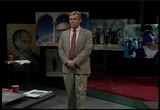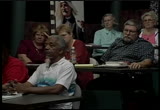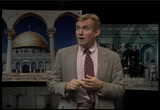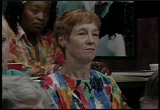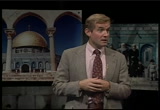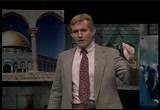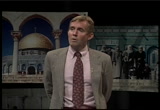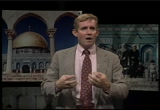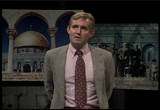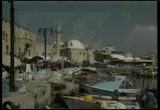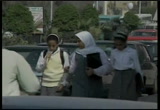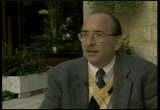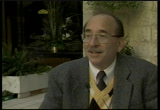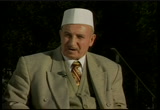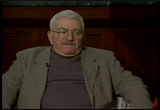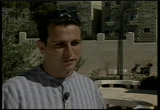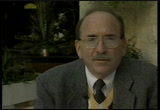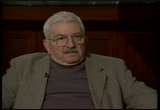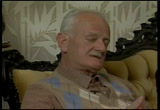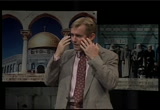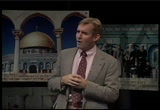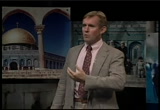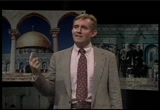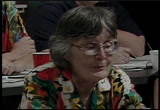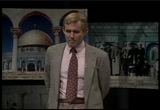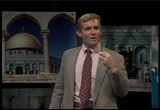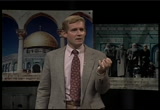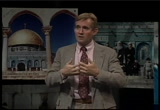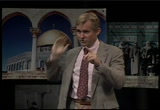tv Al Jazeera World News LINKTV April 18, 2013 7:00pm-7:30pm PDT
7:00 pm
welcome to another session of beliefs and believers. we've been talking about the ethical dimension and literally wrestling- well, i don't know if anyone was wrestling back there, maybe just about to- but i think we've got a sense of how difficult it is to discuss ethical challenges even in a very civilized setting like this.
7:01 pm
you can imagine what happens in a less than civilized situation because it's just very frustrating when you have so many visions of what proper patterns of action are. particularly when we get to the social dimension, we're going to talk about religious diversity in the united states, and we'll see that maybe one of the things that creates a sense of peacefulness in the social environment is that we have so many different religions and a first amendment that protects religious freedom that we don't have one religion rising to the surface or competing or two or three. well, one thing we wanted to do with our new version of beliefs and believers is to go to a part of the world where we do see more of the tensions between religion, and the spot we picked on, dare i say, was israel and then to some extent egypt. and we wanted to go to israel in particular because there isn't such a diverse cultural environment in terms of religion, so that the tensions are, in some senses, watered down. as we all know, unless you've been meditating
7:02 pm
in a cave for the past 20 years, israel and the social environment in israel is very tense in terms of the relationship between the three great faiths that actually share something of a cultural tradition- judaism, christianity, and islam. and so what we- we have an extraordinary opportunity, and something like a great risk. i'm surprised david ainsworth, our executive producer, hasn't come out and read this e-mail message i sent to him about three days before we're ready to go on this journey. we planned it of course for several months. we're talking about a crew of at least six people- a lot of preparation, and of course, at the time when we were set to go was one of the worst possible times in terms of the tension; you know, again, another flare-up between the united states and iraq. and i had just heard on cnn, which i finally stopped watching that the state department
7:03 pm
said, "americans, don't go here- do not go." and i wrote david this teary, ethical letter, actually saying, "my responsibility as a parent seems to keep me from taking this journey." but i was serious. i mean, i really wrestled in terms of responsibility, ethical patterns of action, because we were hearing some very frightening things about the animosity over there. when we got there- i mean, the tendency, even though you've heard about it, is to think, you know, i'm just a humble religious studies professor from burrell, illinois- you know, i'm no threat to the islamic community. but you come over there, as we'll see, and you realize that you become a symbol for something way larger. and since we're talking about the ethical dimension and its impact on the social dimension, i can't stress enough what we discovered in our conversations, that while saddam hussein is seen as a brute and as an unethical person,
7:04 pm
really, within the islamic community, they'll still take his side over a much more detrimental ethical force, which they look at as the secularization, the image of globalization that comes from the west- they see it as a potential to take over their environment- and we were certainly an outcast. as i mentioned in the last class, i'm real glad i didn't know that as i was wandering around the environs of israel in particular, but there was an edict- wrong word; i don't know the muslim word for it- but an edict that had come from a regional imam that said if the united states did in fact go to war in terms of the bombing of iraq, which was expected to happen the monday after we arrived, then it was in fact justified ethical patterns of action again for muslims to attack american civilians within those environs. now we had some really,
7:05 pm
really unusual experiences, because we're very well organized- we were in a bus, which is a great idea. we had an arab guide who was magnificent and saved us mucho dollars- or shekels, i should say- over there, and may have saved our lives in a couple of instances by knowing where to go. when we were moved through- he knew through networking within his own community where the hot spots are. for instance, one week it was possible to go to bethlehem, which is in palestinian areas, but certain things were happening and he would know a couple days later, "not safe; don't go there." just some really- we got so over into the west bank that we could actually see jordan, and yet we were able to move through communities in the palestinian territories with all the machine guns and those things you've seen- you know, the towers and the places where the palestinians are stopping- we managed to move through those kinds of tense situations
7:06 pm
with minimum hassle. so i'm very glad to be back and alive. but the key thing is what we were able to accomplish. with our incredible contacts, we went directly to nazareth. and actually, networking is an amazing thing, because the local episcopal priest in mccomb, of all places, mccomb, illinois, has an amazing international reputation- amnesty international, these kinds of organizations that work for justice- and he set us up with some key people in the arab christian community where we started out in nazareth, and in fact, our guide, as i said, was an arab christian, which is an interesting story in its own right, you know, how those people put up with some of the tensions. but we were able to meet real authentic people and place our questions to them. what we want to look at in terms of this class, and we have some extraordinary roll-in material of these interviews is we have several pieces. the first is simply going
7:07 pm
out into the community and exploring those ethical conflicts. what happens when you have three great religions that share many of the same similarities, but they live in a tightly bound community, where obviously, one group has more political power? so we want to look at the political power, but in our second major roll-in piece, we learn very quickly about land- i mentioned that in the previous class- but the land becomes a very important issue. obviously, as you well know, the whole question of the creation of the state of israel in 1948 out of palestinian land, the arguments there that go back and forth, are just mind boggling- you know, talking about our ethical conflicts. you know, should the israelis have been in that particular spot? why not a spot in africa? why not give them mcdonough county in illinois? you know, the question of land and sovereignty.
7:08 pm
or is it this place? and as we'll find out in the interview, there's no consensus within the jewish community. you know, we have zionists and anti-zionists, we have religious zionists, we have religious jews who are anti-zionists, and so that tension goes on. so we'll look at the land issue. then we'll also look at issues in egypt involving kind of intrareligious struggle. and finally, a remarkable interview that i- i'll save explaining that till i set it up, but with a young muslim student, actually, who we ran into in cairo and had a very, very up front, real, and personal discussion about what it's like to be a young person in a predominantly muslim country. yeah, helen? >> did you see any tension between the ashkenazi and the sephardic populations? >> did not see it but heard about it. >> and between the secular and the religious views, did you see that? >> that, definitely.
7:09 pm
yeah, we definitely saw that. so let me get the ball rolling here, because these are actually well longer than our normal roll-ins, but i think it's appropriate when we have such an unusual setting. as we go through this, though, let's keep in mind our previous lessons from the previous class about ethics, patterns of action, how people try to conduct themselves, and see how there's these inevitable conflicts with- good comments we had in the last class about how yes, we're speaking about religion, but we're speaking about land and nationalism and politics, and just human frailty, you know, human complexity. so with no further adieu, let's go to our first roll-in on ethical conflicts in israel. >> the motivational heart of the ethical dimension is the quest for the good life. how are we to live as human beings in a way that is good, aesthetically pleasing, and enduring? in the bustling commercial centers of the middle east, people turn to religion
7:10 pm
to find answers to the all-important question: how should we then live? jews, christians, and muslims shape their communities according to ethical precepts drawn from religion. day-to-day activities such as shopping for food, eating, working, sharing time with friends, or praying are guided by the ethical dimension. but what happens when people of different faiths living in the same social environment differ as to what constitutes the good life? our visit to israel and egypt, where religion is the controlling factor, revealed that ethical conflicts are widespread- life is not so good. religious doctrines, or beliefs, define ethical patterns of action, which in turn have enormous impact on the social dimension. as jews, christians, and muslims sort out the tangled web of daily interactions, it is often political power that plays the primary role
7:11 pm
patterns of action takeer precedence in the social arena. as we speak with everyday citizens as well as prominent religious and political leaders, notice once again the powerful relationship between the doctrinal, ethical, and social dimensions. >> here in israel, everything is interweaved. as one of my friends says, politics is religion; religion is politics- you can't get away from the politics. but we do try, to some extent, conduct an interfaith dialogue similar to you would do in other places in the world, and in that way, we sort of check our politics at the door and say we agree to disagree, and we're not here to solve our political issues- other people can try to do that- and we try to get to know each other first as human beings, and secondly, to learn about each others' traditions. so much of our dialogue has been, in a way, apolitical or nonpolitical, and it's enabled us
7:12 pm
to do things we couldn't do otherwise. >> it seems that the division between muslim, jew, and christian is pretty extreme. what kind of commonalities can you find in your interfaith dialogues? >> well, we did a project two years ago, which we called "common values, different sources." the idea was to take basic values that we thought we all shared- the search for peace and justice, tolerance, the value of education in itself- and to learn some of each others' sources- a text study on these things. and we did that for a year, with five different meetings, and now we're publishing a book on that subject- common values, different sources- and it was kind of amazing to see how much we in fact did have in common. some of the people who've never been involved in this kind of dialogue before said that it seemed we were stealing eaeach others' texts, because they weren't aware of influence during the ages of other peoples' text.
7:13 pm
but that kind of thing, when you look at some core values that the three faiths share was very instructive to a number of a people. >> [speaking in islamic] >> [translated] we treat our brothers, the christians, as one society. >> [speaking in islamic] in this holy city of nazareth. >> [speaking in islamic] >> since trying to- because we were born here. >> [speaking in islamic] >> we live together as neighbors, as brothers, in both sad events and happy events. >> [speaking in islamic] >> and we believe that love
7:14 pm
still reveals between us. >> [speaking in islamic] >> for this, we are always happy. >> lately, we have been, you know, i can say united for the right of the palestinians. the christians are no less nationalistic than muslims are- maybe to the contrary. we don't show it, we don't use force. and you know why? we cannot use force because then we are not christians. we fight with love, and i think we succeed- succeed more than fighting and struggling with arms. so we are feeling the consequences because too many christians are leaving the country. and when it's possible, if the americans were- when they open the gates,
7:15 pm
too many, and very few will stay here. >> i don't have - like from one side, the arab people, the muslim people, and for the other side, the jewish people, and we are in between that, you know. the christian people are a christian people that are in the middle. if you're going to a lot muslim people, so they would say, okay, you are christian, and it's a big problem for you. and if you go into the jewish side, they would say the same, you are christian, you are arab. and you are in the middle, you know, like pulling off - and it's very bad for us. and i'm thinking to go out from here, it's better than staying here. >> because you just made a really good point. i mean, there's no country- you know, you don't have a country here. >> exactly. >> even if they did eventually divide up palestine and israel, the two states, you still have no country. >> we are still
7:16 pm
without country, yeah. even if there is palestine and arab government and everything is arab, it will stay like their religion, and i don't belong here and i'm very sure of that, you know. >> well, you mentioned that you have three daughters. we've obviously seen some tensions between the arabs and jews. for instance, if one of your daughters wanted to date an arab boy, would that be acceptable in your eyes? >> it's one of those questions that you hope doesn't happen, and in my case, i doubt very much it would happen. but if you want to be very hypothetical or theoretical, it would not be acceptable in my eyes. one of the reasons that we moved to live in a jewish society in a jewish state was to live in a place where the threat of intermarriage is very, very small. and besides the fact that my kids all got very strong jewish and zionist upbringings, it would be the furthest thing from any of their minds in any event. that's not to say that in their social life
7:17 pm
or in their academic life or in their sports life they wouldn't associate with arab teenagers. my youngest daughter, who's now in twelfth grade, plays basketball, and she was on a mixed arab-jewish team earlier this year and got along fine with the kids there and has been to encounters with arab and jewish kids in israel and is very interested in that kind of activity. but to jump from that to marrying or even entertaining would be a big leap. >> she's an oppressor, very especially to the brothers, palestinians living in the occupied zones. we are better off and we live good here- i mean, we have to admit. but we still feel with others- you must feel with others- far from where we live in america. we are all brothers, and we have to feel with each other, and we feel very much with these people who will know no peace.
7:18 pm
not one single day passes without trouble in these areas. and i think being a christian, i cannot side with an oppressor. >> let's get to the point. this behavior- in a good behavior, in good conduct, to keep in touch with others is our challenge all the time to build a new world, a new, nice village, to live together in peace and harmony and love for each others. we aren't satisfied on what happened all the time. i am 68 years old. i have not seen even one good day in my life. i'm struggling always
7:19 pm
day and night. searching for a good day. >> that was one of the most poignant interviews- >> i was just going to say, that was a tearjerker. >> oh, i- let me tell you about mr. fahoum. he was so polite and had us in and we had a whole lot of caffeine and a whole lot of sugar. but nevertheless, we had gone through an interview, and you know, it was rather perfunctory and we were getting some stuff down, and that actually was- we said, "the interview is over," and then he picked up, and we just got to talking like, you know, a couple of human beings, and other people were in the conversation, and he says, "i'm 68 years old and i've never had one good day," and you know, he's getting tears in his eyes and we're all getting tears in our eyes. and this is the challenge of it, as you heard from christian speakers. sam, the young fellow that you might have seen there, he was actually our guide- 21 years old, handsome,
7:20 pm
talented, facility with languages- he grew up there. he's a christian arab- he can't figure out how to find ethical patterns of action; he can't find a place in the social dimension. and the fellow's leaving, he's going to italy. i think as dr. farrar, our host in nazareth, said, "you know, if the united states were to open the gates, the arab christians would just leave." you know, they were leaving their homeland, and it's a beautiful land. but that's the kind of, you know, the difficulty, the challenge that you see there. it almost makes you feel, well, as bad as things are in the united states from time to time, wow, what pressure. yeah, janet? >> i was really inspired by mr. fahoum's comments about everyone living together gather in peace. don't they routinely kill people who try to do that in the middle east? the leaders who try to work with that? it seems to me i remember
7:21 pm
that they get killed. >> and threats all the time. the people that we met, it had to be handled very, very carefully. and we had things that weren't on the tape, but mr. farrar, the gentleman with the beard and the gray hair, said that he fully expected because of a certain issue of a conflict with a mundane nature within the community of nazareth, he expected within the next couple of months for some christians to be killed. and they were killed- we heard from our connection. and this happens all the time- that's what they mean by not one good day. but the other thing that may have gone by a little quickly is all these people, for the most part, that we talked to were on, you know, this side of palestinian territory. in the territories, it's even more oppressive, it's even more difficult, where the land is separate. it's such a challenging issue on how people- and you could sense my
7:22 pm
frustration, and this is what always happens when i get to the ethical dimension, because i wouldn't be in this business of teaching religion if i didn't love the subject area, and i tend to appreciate the beauty and the good in religion, and yet you go into an environment like this- and we've already mentioned in the previous class, several other around the world- and you find that people- i mean, what is it? is it identity and relationship is such a fundamental impulse that it's injected with political feeling and you find yourself in conflict that this inevitably happens? i mean, it's just- it's so frustrating that religions can't see their way out. as dr. fahoum said- you know, the 68-year-old gentleman who hasn't had one day- he's not unlike in the previous class professor robert moore with his institute for world spirituality- he says, "we've got to make a new heaven and a new earth. we've got to create a society that overcomes these differences." for them, the survival is obvious on a day-to-day basis
7:23 pm
when their friends- as you say, janet- leaders, people who speak out like this, can be killed. as a matter of fact, we had to be very careful to have representatives from each group- and this is something that was beyond our comprehension. they said, "well, if you're going to talk to this person, you make sure he's on camera, and this person's on camera," and we just said, "fine, okay. just give us your directions." so that's the kind of thing we experienced there. yeah, virginia? >> i was thinking as i was watching these different people how hard it is for americans who are maybe diversified but we are isolated from the majority of these things to undstand the tension in which they live. if they say hi to somebody and that person says, "i'll slit your throat- what do you mean?" or if somebody says, "he was fraternizing- get him." i mean, you don't know,
7:24 pm
the tensions of simple living, where you don't have people who are wearing a badge saying, "i'm not your friend," or, "it's okay to talk to me." how do you know who you can talk to? >> i mean, it must be so oppressive, yeah. >> yes, and how do you know in raising your children that one of these children might not be the victim, and there you are. do you retaliate? do you start a whole situation because of your own personal loss? i responded so to the man who said, "i have not had one happy day," because he was thinking just of himself- his whole family, you know. he could be happy if somebody in his family was happy, but how do you know? >> and you think back to bob moore's comments about creating a sustainable environment for our children's children. and how do you- you know, we see the children on the streets, and you know, that's what got me. the first place we stayed was in a seminary, an eastern orthodox seminary-
7:25 pm
a rather spartan setting, to say the least. the bar didn't stay open very late. no. but i remember it also served as a school. and so i was looking out my window in the morning, and i saw the parents in their cars bringing their children to school, and i said, "if i was home, that's exactly what i would be doing, i would be dropping lilly and sophie off at school, and here they're doing the same thing." it was the fact that the elements we experience in this culture are the same- it's what we tried to do in the roll-in. people need to shop, people have children, people have friends, people want leisure time, people want to have one good day. but what is going on here when the source that we're studying- religion, which is, you know, the guiding force, hopefully, towards harmony and peace- plays such a strong role in tormenting the people in this environment? i mean, it's a kicker. jeff?
7:26 pm
>> is there a parallel here? i mean, in terms of studies? just because of the terrible conflicts- i mean, it's obvious that the people in the roll-ins have suffered and are suffering- between an individual ego state and the religious identity, and is there a religious ego, as a community of the same believers? or is that even a right term to use? >> no. i think what you just hit on is another one of- you've articulated one of my key frustrations. or maybe it's a dilemma with religion. most certainly there is a religious ego, and i think that's exactly what we're seeing here. i think this is a strange peculiarity, but we're only human. you know, remember religion is
7:27 pm
ideally about the transcended- it's about going beyond boundaries, it's going to another place. and yet the only way we know is from our sense of self, which is filled with its own individuality- it's that a part and apart thing that we talked about very early in the semester. religion is a force for transcending these kinds of restrictive boundaries. at the same time, you bring in the doctrinal dimension, which makes those boundaries more rigid, so that you can know who you are. so i think what you have here is very much a religious- a set of religious egos that are very large that people have plugged into- you know, their individuality plugs into it collectively, and it's that much more powerful and that much more volatile. it's really true. how you get out of that- you know, we're talking about the social dimension- once you say, "i have this set of answers to profound
7:28 pm
life questions. i'm going to call it this, be it jew, muslim, or christian. i belong; they don't agree," then we're already into bumping up against each other. and i think the question that these people are reaching for in each of the traditions and that we've seen in other instances is, you know, how can you be a christian or jew or muslim or buddhist, but also have more than just appreciation but some interconnection, some true dialogue with someone who's different? very difficult. very difficult. to keep the ball rolling, we have another longish roll-in that adds an important piece to the puzzle, and i think it adds to what jeff got me talking about here, which is the land issue. this was a lesson you had to learn, it's a lesson that people down through history have struggled with.
7:29 pm
it's not something that you grow up in this country, at least if you are a person who grew up the way i grew up, you just don't even think of this thing about land and identity. you know, we've got private property here and in my quest to find running room out in the wilderness out in mccomb, i've been run off by hunters on plenty of private property, so i know that. but that's not what we're talking about here. we're talking about land, sovereignty, identity, and the religious ego, to use your good term. land fuels this religious ego, and as we well know, it's a real problem here. so what we wanted to do is then try to- in terms of ethics again in the social dimension- how do proper patterns of action get skewed or turned on their hand or in some way misrepresented over another equally intense quest. you know, you've got the religious quest for god, the divine, the good life, but you have the land quest for something along the same y,
86 Views
IN COLLECTIONS
LinkTV Television Archive
Television Archive  Television Archive News Search Service
Television Archive News Search Service 
Uploaded by TV Archive on

 Live Music Archive
Live Music Archive Librivox Free Audio
Librivox Free Audio Metropolitan Museum
Metropolitan Museum Cleveland Museum of Art
Cleveland Museum of Art Internet Arcade
Internet Arcade Console Living Room
Console Living Room Books to Borrow
Books to Borrow Open Library
Open Library TV News
TV News Understanding 9/11
Understanding 9/11
